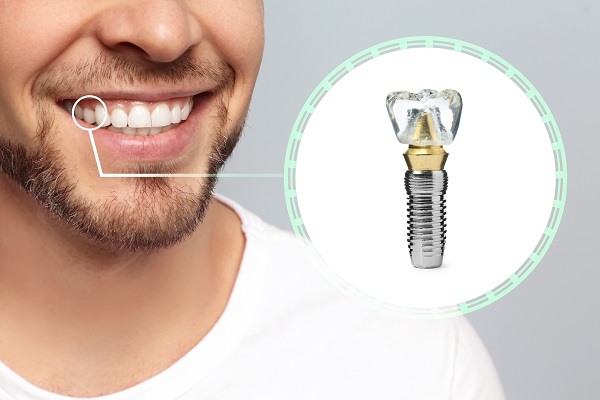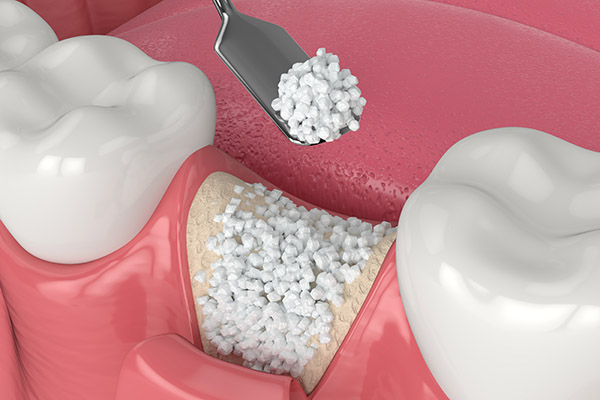When Would You Need Dental Implants?

If you have ever critically damaged or lost a tooth and had it repaired, you probably had a dental implant set. A dental implant is a metal fixture installed by a dentist that fuses to the jawbone via a process called osseointegration. This allows for artificial teeth to be securely placed on top of it. Dental implants replace tooth roots with small posts that are normally made of titanium. A dentist then connects an abutment on or into the dental implant which attaches to the crown. A person could need dental implants for several reasons, and there is more than one type of dental implant.
Why someone might need a dental implant
A dental patient could need a dental implant for the obvious reason that he or she is missing a tooth. Any adult with one or more missing teeth could be a candidate for dental implants. In some cases, teenagers are eligible for them if their facial bone formation is complete.
Someone who has dentures that are restricting their ability to eat and converse freely may also be a candidate for dental implants. If you need dental implants, see a dentist quickly after losing a tooth. Waiting too long could result in the need for bone graft surgery to restore the jawbone enough to carry implants.
Enhanced appearance
Dental implants can fill one or more gaps in your mouth with a natural-looking artificial tooth known as a crown. Though a missing tooth, especially in the front of the mouth, is a cosmetic concern, it can also cause bone loss. Implants assist in the preservation of bone and promote further bone growth. This restricts facial regression. Further, it diminishes the possibility of gum disease and additional tooth loss.
Better speech
With missing teeth or ill-fitting dentures, your speech can be affected. Dentures can slip or move, thereby causing slurred or mumbled speech. Missing teeth can also cause lisps or other language issues that are embarrassing and frustrating. Because dental implants are permanently affixed to your jaw, they allow you to speak without anxiety.
Increased comfort
Dentures can cause sores in the mouth, especially if they do not fit correctly. They are also removable, so you must use adhesive to get them to stay in place. Once dental implants are placed in your mouth, you do not need to fuss with them other than to care for them as you would natural teeth.
Easier chewing
Since dentures are notorious for coming out of place, they can make chewing difficult. Likewise, gaps in the mouth make eating uncomfortable or challenging. Dental implants restore the functionality of the mouth allowing those with them to consume food conveniently.
Improved self-esteem
Missing teeth or uncomfortable dentures are often sources of humiliation for those dealing with them. Dental implants restore patients' smiles and give back their sense of confidence.
Better oral health
Other tooth loss solutions, such as bridges, sometimes require the reduction of surrounding teeth. Implants allow you to keep more of your natural teeth which improves your long-term overall oral health. Further, individual implants allow access between teeth, increasing the patient's ability to brush and floss as efficiently as possible.
The two types of dental implants
Before committing to a dental implant, your dentist will converse with you about which kind is best for you. There are two general types of dental implants: Endosteal and subperiosteal.
An endosteal implant is the more common type of fixture. Made of either titanium screws or blades, these are inserted where your missing teeth should be. After four to six weeks, the abutment is attached to the implant and artificial teeth can then be placed on top of it.
Subperiosteal implants are a little different from endosteal implants in that they rest on top of the jawbone instead of fusing to it. Your dentist may recommend these instead of an endosteal implant if your jaw is not suitable for endosteal. Subperiosteal implants might also be a better option if you want new teeth faster, as they have a briefer healing process before the teeth can be mounted.
Conclusion
Dental implants can take a damaged or lost tooth and replace it with an artificial one. Their installation is usually relatively painless and can restore your smile. Because there is more than one type of dental implant, you might have some choice as to what kind you can get. People with missing teeth or dentures may be candidates for dental implants. There are many benefits to them and they generally improve their wearer's quality of life.
Request an appointment here: https://implantfamilydentist.com or call Miami Implant & Family Dentists at (305) 230-4040 for an appointment in our Miami office.
Check out what others are saying about our dental services on Yelp: Dental Implants in Miami, FL.
Recent Posts
Dental implants are one of the most common ways to replace missing teeth in general dentistry nowadays. These are screws or rods (typically made out of titanium) that can serve as artificial teeth roots. Oral restorations like crowns are fitted to implants to replace missing teeth. Implants are constructed to last a lifetime, but the…
Dental implants can provide you with strong, natural-looking teeth. These are the strongest teeth replacements you can get. Having a titanium rod as your prosthetic root will give you stability as you talk, chew, and bite. One missing tooth needs one dental implant. If you want to know more about single-tooth dental implants, here are…
If you have a missing tooth, a dental implant and crown can be used as a replacement. The implant restoration replaces both the missing tooth and the root. This option is preferred over other tooth-replacement options because it looks and functions like a natural tooth, and it achieves that without compromising the health of the…
Dental implants are the gold standard in teeth replacement. These restorations are durable and biocompatible. Most people prefer durable and stable dental prosthetics to removable dentures. Implants owe their security to the prosthetic root and dental crown. If you want to know how the prosthetic root and crown help dental implants become stable and strong,…


